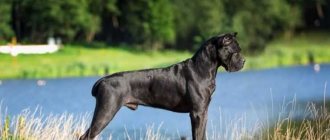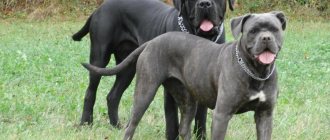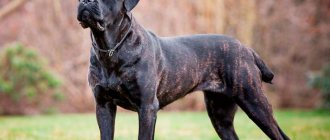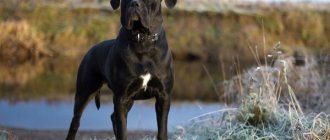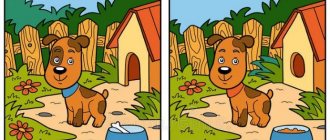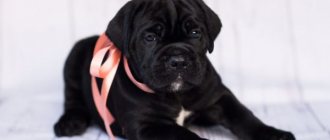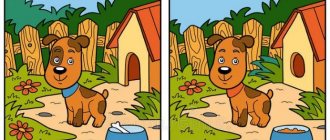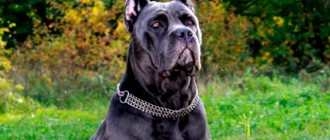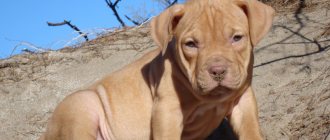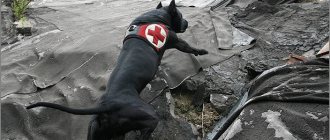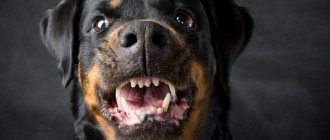A man in the guise of a dog - this is exactly how they speak about the Cane Corso breed. Brutal giants of Italian origin have high intelligence, remarkable protective qualities and a pathological love for children. Such an animal is suitable for an experienced owner who will take a responsible approach to the training process. Of course, each pet has individual character traits and behavior, but there are some qualities that are unique to Corsas.
Characteristics and description of the breed
A combination of power and elegance - this is how these mighty beauties can be briefly described. What epithets were given to them: brave, like a Corso; descendant of gladiator dogs; a reliable bodyguard and a loyal friend.
Aggressiveness
They are not evil by nature. But outsiders are viewed with caution. Attacks only when commanded by its owner or in response to hostility. Males are pugnacious during puberty. A healthy dog does not show unreasonable conflict. Build connections like this: you are the boss, the leader, and your four-legged friend obeys. Your word is law!
Activity
Require daily physical and intellectual activity. If there is insufficient activity, they will begin to dominate, this is a serious test for the owner. Puppies need early socialization. Despite their outward solidity, they will not refuse to play or jog.
Training
It is advisable to go through a general training course (general training course) with your puppy. Early socialization is encouraged. At 8-9 months you can take the “Dog in the City” course.
Shedding
Corsas shed their hair twice a year. During this period, comb the coat daily with a rubberized mitten, removing dead hair.
Need for care
No special care is required. You need to monitor the condition of the coat, periodically wipe the eyes and ears, trim the nails once every two weeks, feed well and take long walks.
View this post on Instagram
Posted by Christina (@tiksya) Nov 19, 2021 at 7:11 PST
Friendliness and attitude towards children
A nanny dog is about a Cane Corso. Genetics tells us to protect those who are weaker. The child is always under strict control; the Corsica will never intentionally offend the baby and will tolerate his pranks. Explain to children that animals should be treated kindly and respectfully.
Health
Health is good if there are no genetic diseases.
In the first year of life, two sets of vaccinations are necessary. In subsequent years - one complex at a time.
Before vaccination, the animal must be dewormed. Drugs are given strictly by weight, consult your veterinarian.
Treat your pet for ticks and fleas every spring. There are drops, there are tablets - the choice is yours.
Attitude towards loneliness
Corsovs cannot be left unattended for long. Separation from the owner is painful, they refuse to eat and can even die. He will not survive the betrayal of his man.
Try not to leave your puppy or teenager alone for long periods of time. If he gets bored, he will entertain himself with chewing. They chew everything: furniture, wires, telephones, passports, linoleum. Buy more toys and stringy bones so that you have something to do in your absence.
Maintenance cost
Expensive, expensive, and again expensive. It will cost 7-8 thousand per month for food. Add to this unforeseen expenses for veterinary care, vaccinations once a year, equipment for walks, toys, treats, classes with a dog handler.
Intelligence
Many owners note very high intelligence. Kors understands everything, as a person, is a wonderful companion, loves to do everything together with his owner.
Noise
Not prone to unreasonable barking, neighbors will not complain. He behaves calmly in the apartment.
Security qualities
The cors carefully guards its habitat. This property is inherent at the genetic level, even without special training. He clearly divides people and animals into two categories: his own and others.
Lifespan
The main disadvantage of the breed is that they live a short life, only 10-12 years.
Character of the Corso
The Cane Corso breed is calm, balanced, self-confident, full of inner strength. But such a sedate dog is unlikely to refuse to play and frolic, because for a long time he remains a puppy at heart.
The Italian Corso loves activity and is not meant for lying on the couch. Exercise will not only keep your pet in great shape, but will also make him calmer and more obedient.
Representatives of the breed get along well not only with people, but also with various living creatures living next to them. A cat and even a parrot can become a cane’s friend.
It is difficult to disagree with the statement that Cane Corsos have a rather severe appearance. Therefore, you should not be surprised if some passers-by decide to cross to the other side of the street after meeting such a dog. They don’t know that behind the stern mask there is a very kind and affectionate pet. And only knowledgeable people, mainly owners of the breed, understand that such a loyal and understanding dog is very difficult to find.
You should not expect a sudden display of aggression from a dog.
But she is always on the alert and carefully monitors the surroundings of her beloved owner. The animal immediately understands who can be considered one of its own and who can be considered a stranger. Sometimes it seems that dogs intuitively sense the danger posed by a person, long before he demonstrates his bad intentions. It is impossible to distract a Cane Corso from such observations; they will never take a treat from the hands of a stranger.
Photo: https://pixabay.com/photos/cane-corso-dog-puppy-pet-animal-4044836/ All the animal’s thoughts are reflected in its intelligent eyes. As the owners say, if “Italians” could speak, they would become their owner’s best companion and interlocutor.
The Cane Corso breed is not jealous.
But they vitally need human attention and love. You should not get this dog for “show-off” if you cannot devote enough time to it and are often away. The animal will become sad and bored. It may refuse to eat and even die.
Attitude towards the owner
The dog is devoted to all family members, but the most important thing for him is the love of the owner and establishing emotional contact with him.
Cane Corso is a monogamous person. It is very difficult for a dog to endure separation from its beloved owner and the appearance of a new person in its life. It’s worth remembering this when starting a Corso.
“Italians” love to be close to their people, to participate in family affairs, and to be needed. At the same time, they are very unobtrusive. Dogs will not chase their owner, demanding constant attention, or bark loudly. Talkativeness is not the Cane Corso's strong point.
Attitude towards children
Representatives of the breed have a well-developed parental instinct, which calls on them to guard and protect those who are weaker for them: in particular, children. A dog treats “his” child with trepidation, but he will not offend someone else’s either.
Corso is the dog that allows the baby to do whatever he wants with him.
If the games of a small person cause pain to the animal, it will certainly try to move away and hide in a secluded corner. But if the child cannot calm down and chases the dog, the dog will humbly endure even the pain. But such cases are very rare. Usually every child, feeling the boundless love of a four-legged pet, reciprocates. This is how a great friendship is born - a small man and a big dog.
Attitude towards strangers
The Cane Corso does not need to be raised as a guard; all the necessary qualities are already inherent in the dog genetically. The animal protects not only its loved ones, but also its territory.
If the owner shows affection towards an unfamiliar interlocutor, the Corso is calm. If there is a threat in the air, the “Italian” will carefully control the situation.
Representatives of the breed can attack a stranger only in the event of a real threat or on the command of a loved one.
Story
Descendants of Roman gladiator dogs are the pride of Italy. The ancestors of modern Corsi dogs are considered to be Tibetan Great Danes. In antiquity, they were involved in hunting, as guards in military campaigns, as baiting dogs in battles with bears and lions. Later, the breed was crossed with Celtic greyhounds and the duties changed: they took care of livestock and farmland.
On a note! In the Roman Empire, these warriors did not differ in cost from a thoroughbred horse, since with appropriate training they replaced a trained fighter in battle.
Because of the wars, these giants practically became extinct; there were very few purebred representatives left. The caring Italian Giovanni Bonatti Nizzoli, together with his associates, found them throughout the country and engaged in breeding to preserve the species. In 1887, a standard was determined that outlined the distinctive features of the Cane Corso. In 1994, the breed received breeding rights. In 1996, the breed male won the international exhibition. Since then the numbers began to grow.
How much does a Cane Corso dog cost?
Corso puppies are not a cheap pleasure, and not everyone can afford it. Prices for babies range from 200 to 1300-2000 dollars. Puppies purchased second hand will have the lowest cost. However, such a purchase will not guarantee that you did not get a mestizo, but a purebred representative of the breed. In addition, such an animal will not have any documents.
A pet-class puppy in a kennel will cost from 600 to 900 dollars. The price for representatives of the breed class rises to $1,300. But an elite puppy, which has all the makings of becoming famous and famous, can be sold for either 1,300 or 2,000 dollars.
Many owners believe that it is better to spend money once and buy a healthy animal with a stable psyche and balanced character than to save money once and then spend the rest of their life either re-educating the dog or treating it.
Appearance
Very large in size and terrifying in appearance. Males reach a weight of 45-50 kg with a height of 64-68 cm, females weigh 40-45 kg with a height of 60-64 cm. An athletic build, broad shoulders, a full-bodied muzzle, and a graceful gait reveal the genetics of the Molossian Great Dane. The body format is stretched.
Head
Large and massive. The muzzle is voluminous, square in shape. Jowls should not be too saggy.
Eyes
Widely spaced, rounded, dark iris color preferred (black or brown).
Ears
Fit tightly to the head, medium in size, widely spaced. The ends taper and fit close to the cheeks. When docked, it is given a triangular shape and looks more menacing.
View this post on Instagram
Posted by Yulia's Dogs (FCI Kennel) (@yulias_dogs) Nov 20, 2021 at 8:14 am PST
Jaws
The jaws are powerful and can easily handle the tibia of cattle. The lower one protrudes slightly forward.
Torso
Longer than the height at the withers, the body is dense, the croup is slightly sloping. Developed chest bone. The back is muscular. The ribs should not protrude.
Neck
Strong, powerful, muscular. The same size as the head.
Tail
Massive, long from birth, but it can be docked.
Paws
The limbs are oval, the fingers are gathered into a ball, the pads are elastic, the claws are strong.
Wool
Short, shiny, dense, close-lying, sparse undercoat.
Color
Mostly black (considered the standard), brindle, light red. Less commonly, gray, slate, fawn. There may be white spots on the chest, paws in “socks”.
Note! Individuals of brindle and red color with a mask up to the eyes.
Maintenance and care
Despite the impressive dimensions, they are suitable for an apartment. The ideal option is a private house with a large garden area where the dog can run around to his heart’s content. It is not advisable to place them in an enclosure: short fur does not keep them warm, they freeze outside, but they are Italians! And even more so, it is unacceptable to keep a Corsa in a kennel on a chain: constant presence next to the owner is necessary for a cane.
Nutrition
They eat a lot. Nutrition should be balanced, with plenty of protein. If you decide to feed dry food, choose premium or holistic. With a natural diet, the basis of the diet is meat and offal. As for foods, do not give pork, long bones, smoked meats, river fish, fatty sour cream, millet and pearl barley porridge, and sweets.
Be sure to give vitamins, calcium, the dog is heavy, additional minerals are needed for bone formation.
Feed 2 times a day. Make sure there is always fresh water.
Hygiene
The main problem is drooling. Keep a towel handy at all times.
Short hair does not require special care; bathe once every six months. It is recommended to use dry shampoo once a month.
To clean your ears, use a cotton pad and periodically wipe the earwax off.
Special bones clean your teeth. If tartar forms, contact your veterinarian.
Wipe your eyes regularly with a disc soaked in chamomile infusion.
Lubricate the paw pads with vegetable oil to avoid cracking. After a walk, paws should be washed, as the streets are sprinkled with reagents that are harmful to the skin. Due to the weight of Corsas, their paws often get cut; keep an eye on their condition and use special wax for their paws.
Health and illness
Like any large breed, Cane Corso is susceptible to joint diseases. Unfortunately, femoral dysplasia occurs in 30%. The disease has no cure and can manifest itself both in puppyhood and in middle age (after 5 years). Until the age of two, until the bones become stronger, you should not run or jump a lot. If you live in a house with stairs, take your puppy for walks in your arms for at least five months.
Another ailment common among these giants is allergies. The sooner you find out why, the better.
In third place are diseases of the eyelids (for example, an inverted eyelid). Only surgery will help.
To reduce the risks, undergo a veterinary examination every year, and in adulthood - every six months.
Mating
Breeding purebred puppies requires the fulfillment of a certain number of conditions.
Both parents have documents issued by RKF.
You need to participate in exhibitions.
The male and female must be the same color and similar build.
Puberty occurs at about one and a half years; in Europe, knitting can be done after 20 months. By this age, the dog can give birth to healthy offspring. Mating occurs on the 10th day of estrus. It is advisable to invite a specialist to monitor the process.
On a note! The female's pregnancy lasts 2 months.
Walks
You need to walk for a long time so that the dog spends energy and does not destroy the house.
Remember! A dog that is kind to its owner may perceive other people as a potential danger. Therefore, walk strictly on a leash and with a muzzle.
Origin of the breed
Cane Corsos are descended from Molossian dogs that lived in ancient Rome. These were fighting dogs used by the military. As guards, the animals are unmatched due to their physique, devotion to their owner and fearlessness.
The ancestors of Cane Corso lived in Asia, spreading throughout Europe and other countries along with nomadic tribes. Among the nomads, the dog was used to herd livestock, guard herds and property.
Italians in the 15th century hunted large animals with Cane Corso. Literary works testify to this. The drawings depicted a dog fighting a lion.
The modern Cane Corso breed combines the skills of a shepherd, a guard and a hunter.
Breed selection ceased to be carried out professionally after the fall of the Roman Empire. Only amateurs among the people continued to breed Cane Corso. Later, representatives of the aristocracy refused to recognize the breed and the dogs were considered for a long time to be common, rustic. As a result, the breed's characteristics were gradually lost. Dogs crossed with others and mixed breeds began to appear.
Animals were bred only in rural areas and roamed freely. During the period of active urban growth, the Cane Corso breed rapidly began to disappear. But, fortunately, Italian lovers of the breed, traveling around the world, were able to revive it. A club of Cane Corso lovers was created, in which breeders met. In 1994, the breed was officially recognized and its standard was developed.
Training and education
Of course, it is best to contact a professional dog handler and undergo OKD. If you decide to teach yourself, then pay attention to the following recommendations.
- First, teach your pet the commands “Place!”, “Come to me!”, “Ugh!”, “Near!”, “Sit!”, “Lie down!”.
- Correct behavior at an early age.
- Physical punishment is unacceptable.
- The best incentive is a treat; train on an empty stomach.
- Don't forget to praise.
- Be consistent: if you can’t jump on the couch now, that doesn’t mean you will be able to in an hour.
The authority of the owner plays an important role in education.
Pros and cons of the breed
Cane Corso owners generally speak positively about the breed. A great friend, family man, companion. But it is necessary to know the distinctive features in order to adjust the training. Kors wants and loves to learn. You will have a wonderful four-legged protector with the right training.
pros
- ideal security guard and bodyguard;
- bright appearance;
- stable psyche;
- devotion;
- responds well to training;
- loves children;
- gets along with other pets.
Minuses
- short life expectancy;
- hereditary diseases;
- expensive maintenance;
- drool.
Cane Corso character
Representatives of the breed have a high level of intelligence, developed intuition and intelligence. The animal's nervous system is highly resilient. The dog is devoted to its owner and his family members. She is calm with cats and other pets.
Cane Corsos are good with children . They play with the kids with pleasure and forgive them all pranks and pranks. The dog has innate protective and territorial instincts and is distrustful of strangers. In battle he is brave and merciless. In critical situations, the dog can make independent decisions and act according to the situation.
Photo
Processed with VSCO with c6 presetNicknames
A brutal, expensive dog needs an appropriate nickname. It would never occur to anyone to call a Cane Corso a Ball or a Bug. Choose a nickname based on your preferences, take into account the character of the animal and its unusual habits.
Short names consisting of two syllables sound best.
| For boys | For girls |
| Bruno | Adele |
| Bruce | Alba |
| Butch | Brenda |
| Viking | Grace |
| Hector | Krista |
| Joy | Lilu |
| Space | Laura |
| Kurt | Sarah |
| Lucas | Chloe |
| Marcus | Chelsea |
Dog health
Strong and resilient, the Cane Corso always looks healthy, and it seems that she simply cannot get sick. This is wrong.
Representatives of the breed are predisposed to diseases such as:
- hip dysplasia;
- bloating;
- epilepsy;
- eversion and inversion of the eyelid;
- thyroid disease (hyperthyroidism);
- allergy.
It is imperative to vaccinate both the puppy and the adult dog!
Deworming is also a regularly performed procedure.
